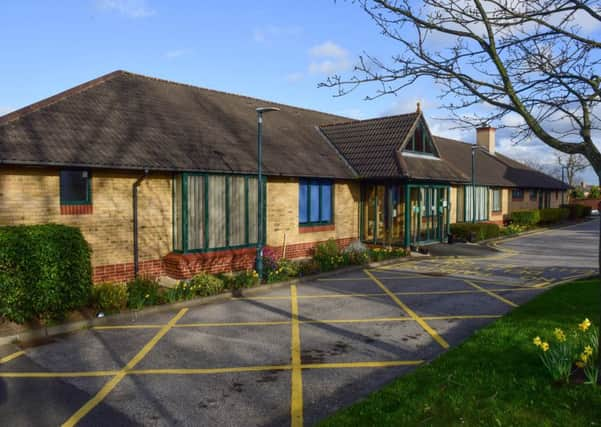Council chiefs say people need to ‘realistic’ about care provision following the collapse of St Clare’s Hospice in South Tyneside


Care leaders are sounding out proposals to overhaul end of life care in South Tyneside following the closure of St Clare’s Hospice earlier this year.
But the public have been urged to be mindful it may not be possible to resurrect the old, Jarrow-based facility, and they may have to lower their expectations.
Advertisement
Hide AdAdvertisement
Hide AdCoun Geraldine Kilgour said: “Our residents have concerns about the narrowness of the consultation, that it leads the direction we’re heading in.
“We have an expectation and a great opportunity, but at the end of the day we have about £800,000 to deliver this with.
“I have a lot of wants, but the reality is they may not be able to be realised and our community needs to be aware of that – that there are restrictions and we might not get what we want.
“We have to be realistic and I don’t want our community to be disappointed with the outcome.”
Advertisement
Hide AdAdvertisement
Hide AdCoun Kilgour was speaking at this morning’s (Tuesday, May 21) meeting of South Tyneside Council’s Overview and Scrutiny Coordinating and Call-in Committee.
This saw the panel agree a response to the South Tyneside Clinical Commissioning Group’s (CCG) ongoing ‘engagement’ with the public over plans for the future of palliative and end of life care in the borough.
This is due to run until June and a report on its findings is expected to be completed the same month.
Key points raised in the committee’s response include:
Assurances ‘governance arrangements’ will be put in place to try and ensure a situation similar to St Clare’s collapse cannot be repeated;
Advertisement
Hide AdAdvertisement
Hide AdCalls to increase the number of patients who can ‘end their life in their preferred place’;
That any replacement palliative care service should have ‘an appropriately homely environment, not just a normal hospital ward’.
St Clare’s Hospice went into liquidation in January after more than three decades providing end of life care.
Since the eight-bed hospice was closed, services have been provided by St Benedict’s Hospice, in Sunderland, and St Oswald’s Hospice, in Newcastle.
Advertisement
Hide AdAdvertisement
Hide AdAccording to a report prepared for NHS bosses, St Clare’s Hospice was funded ‘primarily via charitable contributions’.
It also received about £730,000 a year from the health service, although, according to financial statements available through the Charity Commission, South Tyneside CCG backed it to the tune of £860,000 in 2017.
Matt Brown, the CCG’s director of operations, said: “St Clare’s doesn’t exist [any more], it’s not there to restart, that is simply not doable.
“I want to commit to the challenge of getting the right thing for South Tyneside.”
Advertisement
Hide AdAdvertisement
Hide AdThe scrutiny committee letter to South Tyneside CCG on future of palliative care in full:
Response to the engagement on the future of Palliative and End of Life Care
Thank you for attending our meeting in April to bring us up to speed with the latest situation with regards to the future of Palliative and End of Life Care in South Tyneside.
We would wish to make the following comments to consider within your deliberations regarding the commissioning of the new service:
Advertisement
Hide AdAdvertisement
Hide AdWe were shocked at the closure of St. Clare’s Hospice and the lack of any indication that this was going to happen. We hope that any future service commissioned by the CCG will have governance arrangements in place to ensure that a similar situation never re-occurs.
The present situation does present an opportunity to increase the number of patients who end their life in their preferred place. We believe that the engagement exercise should seek to raise the profile of this important decision with the public at large and the importance of telling their loved ones where they wish to die.
We think that the decision to design a service that is truly co-produced which matches people’s wishes and expectations about how end of life care is delivered is commendable. To design a service which is flexible and responsive enough to meet the wide range of wishes and expectations that people may have will be a challenge.
The future commissioned service must have some form of in-Borough in-patient element to ensure that those who need this type of care can access it. This should be delivered in an appropriately homely environment, not just a normal hospital ward.
Advertisement
Hide AdAdvertisement
Hide AdThird sector organisations could have a significant role to play in the portfolio of services that will make up the commissioned service, although contract and organisational monitoring should be robust.
We wish to be kept informed about the outcome of the engagement exercise and have the opportunity to consider the proposed service model prior to commissioning the service.
I hope you find these comments helpful.
Yours sincerely,
Coun Rob Dix, Chair South Tyneside Council Overview and Scrutiny Coordinating and Call-in Committee
James Harrison
James Harrison , Local Democracy Reporting Service